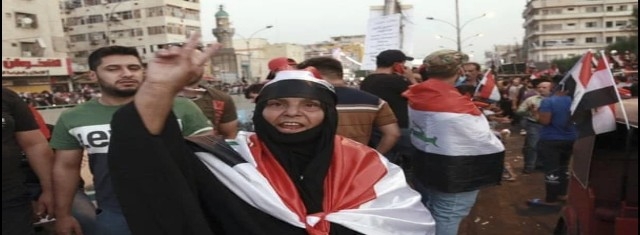News
Iraq- protesters demand removal of Iraqi government
Fear factor is broken

Cover of the issue
USPA NEWS -
The biggest protest movement in Iraq since the fall of Saddam Hussein has pressed its demand for the removal of the elected government, staring down an embattled political elite and the widespread influence of Iran.
Friday´s rallies of tens of thousands came a day after supporters of Iraq´s embattled leader, Adil Abdul Mahdi, believed they had won the backing of one of two powerful figures that threatened his premiership, a development that appeared to stabilise his position on Thursday.
Friday´s rallies of tens of thousands came a day after supporters of Iraq´s embattled leader, Adil Abdul Mahdi, believed they had won the backing of one of two powerful figures that threatened his premiership, a development that appeared to stabilise his position on Thursday.
But the dissenters who thronged central Baghdad on Friday suggested popular opinion, rather than backroom machinations, may determine the fate of the government. The size and momentum of protests has left officials wanting for responses and wrongfooted Tehran, which has not faced a threat to its authority of this scale in Iraq.
“Somehow the fear factor is broken,“ said Ayman Sobhe, a student protester speaking by phone from the Iraqi capital. “You can see it in the peoples´ eyes here.“
Central Baghdad´s Tahrir Square was a chaotic scene of flag waving demonstrators battling with security forces on Friday afternoon. Tuk-tuks ferried wounded dissenters under clouds of teargas. Amnesty International this week accused Iraqi security chiefs of using military grade teargas ““ up to 10 times more powerful than that typically used for crowd control ““ to try to quell the unrest.
“Somehow the fear factor is broken,“ said Ayman Sobhe, a student protester speaking by phone from the Iraqi capital. “You can see it in the peoples´ eyes here.“
Central Baghdad´s Tahrir Square was a chaotic scene of flag waving demonstrators battling with security forces on Friday afternoon. Tuk-tuks ferried wounded dissenters under clouds of teargas. Amnesty International this week accused Iraqi security chiefs of using military grade teargas ““ up to 10 times more powerful than that typically used for crowd control ““ to try to quell the unrest.
At issue for many of the demonstrators is rampant corruption and the impunity of a ruling class that has siphoned off huge cuts from state revenues over much of the past 16 years. Other demonstrators, meanwhile, continue to rail at Iran, which has a whip hand in the affairs of Iraq and significant influence over its legislators.
Since the US-led invasion, political sectarianism has been entrenched by a system of governance that has demarcated power between majority Shias, Sunnis and Kurds in the country. Shia Iran has developed close links to many Iraqi MPs and broad networks within the central institutions. In addition, military groups loyal to Iran have taken prominent stakes in the affairs of state.
Some factions, such as that led by populist cleric Muqtadr al-Sadr, have established a political presence in the country´s parliament and can muster significant influence on lower middle class Shias, many of whom feel aggrieved by a lack of opportunities provided by successive governments.
Since the US-led invasion, political sectarianism has been entrenched by a system of governance that has demarcated power between majority Shias, Sunnis and Kurds in the country. Shia Iran has developed close links to many Iraqi MPs and broad networks within the central institutions. In addition, military groups loyal to Iran have taken prominent stakes in the affairs of state.
Some factions, such as that led by populist cleric Muqtadr al-Sadr, have established a political presence in the country´s parliament and can muster significant influence on lower middle class Shias, many of whom feel aggrieved by a lack of opportunities provided by successive governments.
Al-Sadr had earlier threatened to withdraw his support for Abdul Mahdi´s one-year-old administration, a move that would deal it a near fatal blow if he mobilised loyalists at the same time.
Another influential Shia cleric, Ayatollah al-Sistani, on Friday appeared to give support to the protests, warning of “chaos and destruction“ if security forces continued a violent crackdown that has killed around 250 people since the rallies began, and wounded many hundreds more.
Sistani has often been at odds with the conduct of Iraqi officials, and with Iran, whose influence his supporters say often diverges from the country´s interests. The prominent Iranian general Qassem Suleimani played a pivotal role during the week in stabilising Abdul Mahdi. A source close to the Iraqi prime minister revealed he had warned the outspoken cleric to temper his criticism.
Another influential Shia cleric, Ayatollah al-Sistani, on Friday appeared to give support to the protests, warning of “chaos and destruction“ if security forces continued a violent crackdown that has killed around 250 people since the rallies began, and wounded many hundreds more.
Sistani has often been at odds with the conduct of Iraqi officials, and with Iran, whose influence his supporters say often diverges from the country´s interests. The prominent Iranian general Qassem Suleimani played a pivotal role during the week in stabilising Abdul Mahdi. A source close to the Iraqi prime minister revealed he had warned the outspoken cleric to temper his criticism.
Liability for this article lies with the author, who also holds the copyright. Editorial content from USPA may be quoted on other websites as long as the quote comprises no more than 5% of the entire text, is marked as such and the source is named (via hyperlink).





